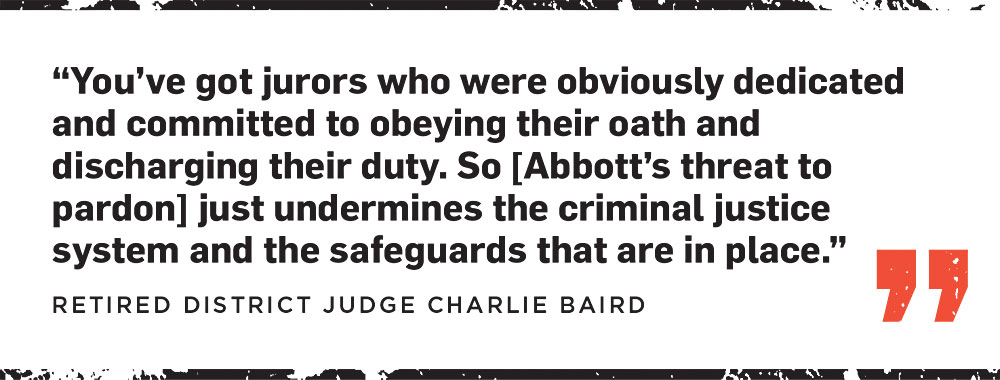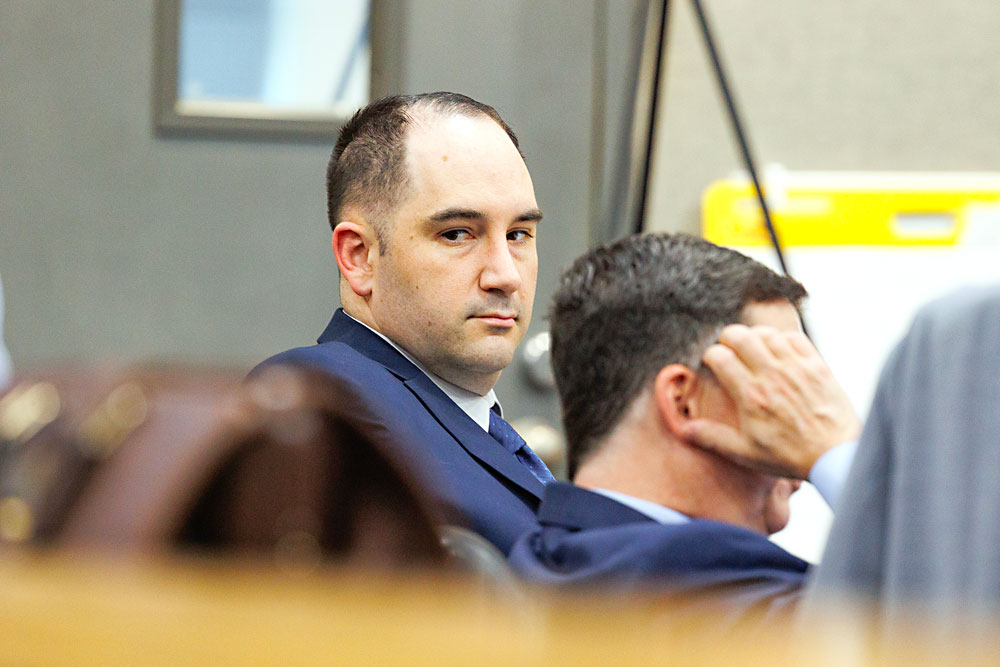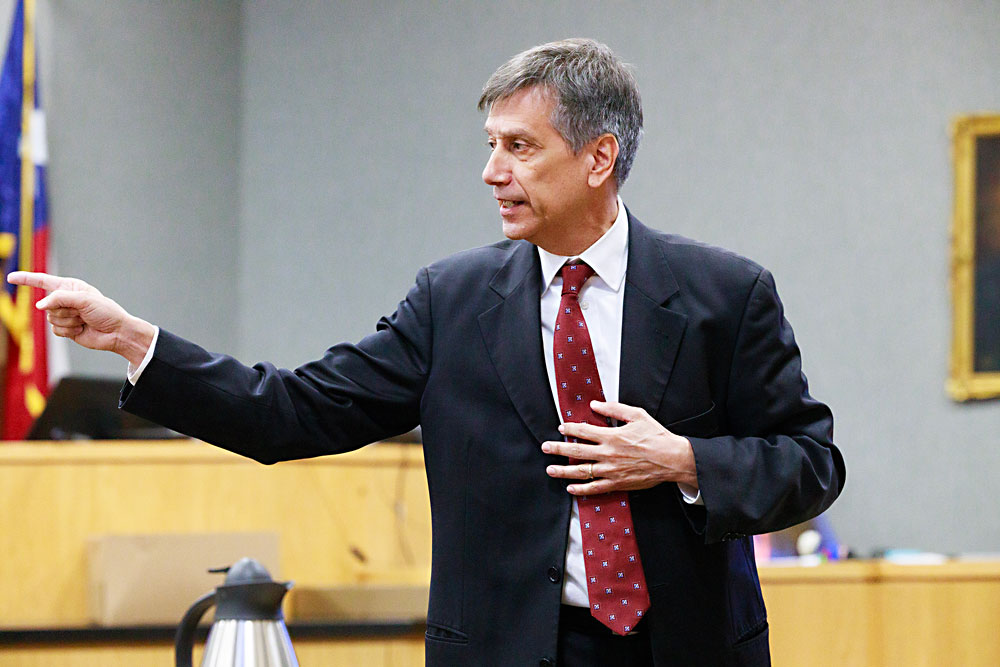12 Jurors Found Him Guilty of Murder. Gov. Abbott Thinks He Knows Better.
An Army sergeant thought he could get away with murdering a Black Lives Matter protester, and he might be right
By Brant Bingamon, Fri., April 14, 2023
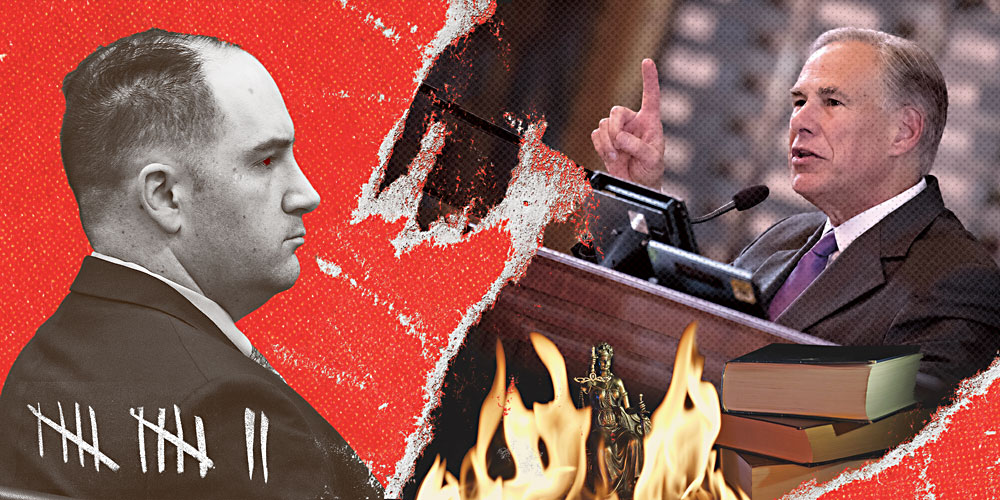
The 12 jurors who served in the Daniel Perry murder trial took an oath to be fair and impartial. They promised to carefully consider the evidence presented to them – eight days of it, much of it very detailed. They spent 16 hours, spread over two days, reaching a unanimous conclusion. On the afternoon of April 7, they pronounced Perry, an active-duty Army sergeant, guilty of murdering Black Lives Matter protester Garrett Foster in the summer of 2020.
Less than 24 hours later, Texas Gov. Greg Abbott promised to replace their decision with his own. The governor did not attend the trial and has not seen the transcript, because it doesn't yet exist. But he announced that he had asked the seven members of Texas Board of Pardons and Paroles to recommend that he pardon Perry, a legal necessity before he takes that action. "I have made that request and instructed the Board to expedite its review," the governor wrote on Twitter. "I look forward to approving the Board's pardon recommendation as soon as it hits my desk."
Perry, stationed at Fort Hood but moonlighting as an Uber driver, ran a red light on the evening of July 25, 2020, and drove into a crowd of about 20 Black Lives Matter demonstrators in Downtown Austin. He stopped and protesters rushed to his car, slapping and kicking it. Garrett Foster, a 28-year-old Air Force veteran carrying an AK-47 in accordance with Texas' open carry law, approached the driver's side door. Perry lowered his window and shot Foster five times in the chest.
Perry surrendered to Austin Police Department officers and in an interview a short time later said he'd shot in self-defense, thinking that Foster was about to raise his gun. The officers believed Perry and released him. He was indicted for murder a year later, and his trial commenced on March 27. In it, prosecutors displayed online conversations between Perry and friends showing that, in the weeks before he shot Foster, Perry had fantasized about killing a BLM protester, even arguing that he could get away with it by claiming self-defense. He was convicted on April 7.
Abbott's promise to pardon Perry came after a groundswell of rage from Republicans across the nation. Within two hours of the verdict, Tucker Carlson, recognizing Perry as one of his own, described him to his Fox News viewers as an honorable veteran who had been forced to defend himself. He called the murder conviction a "legal atrocity." He said he had invited Abbott to appear on his show to ask if the governor was considering a pardon for Perry.
"But for some reason Gov. Abbott's office told us he just can't make it," Carlson said, baiting the governor. "So that is Greg Abbott's position. There is no right of self-defense in Texas."
Immediately, conservatives who'd never heard of Daniel Perry were tweeting about the case. Kyle Rittenhouse, a vigilante acquitted of murdering two protesters in Wisconsin in 2020, tweeted his support. Texas Republican Party Chair Matt Rinaldi retweeted several incendiary posts calling the man who coordinated Perry's prosecution, Travis County District Attorney José Garza, a "[George] Soros prosecutor," a shorthand that became ubiquitous. Attorney General Ken Paxton told Fox News that Garza "cares more about the radical agenda of dangerous Antifa and BLM mobs than justice." When Paxton later wrote that "self-defense is a God given right," 2,000 people responded with some version of, "What are you going to do about it?"
So Abbott was certainly pressured to act. Still, his choice to overrule the jury shocked many, particularly those in the criminal justice system. "This is the kind of thing that happens in places like Uganda and El Salvador," said Rick Cofer, a former Travis County assistant district attorney now working in private practice. "Because they have such a weak rule of law. And if the powers that be don't like what a court does they just ignore it. That is what's happening here."
Cofer added that because Abbott is a skilled lawyer – he is the former attorney general of Texas and served on the Texas Supreme Court – he knows better than anyone how inappropriate his proposal is. "He knows that calling for a pardon in the middle of trial court proceedings is unheard of. It is unprecedented. It pushes against due process. And it treats Daniel Perry differently than every other defendant in the state of Texas."
Many have made the point that there is no way Abbott could be as informed about the trial as the 12 jurors who delivered the verdict. The trial was not broadcast live. It was recorded but the recording is not accessible to the public. The trial transcript won't be finished for weeks. The only evidence and testimony available to those not physically present at the trial is the reporting in print and on archived TV broadcasts. That reporting greatly simplifies the evidence. Lt. Gov. Dan Patrick illustrated the danger of relying on news reports when he told Fox News on April 8 that Foster had pointed his weapon "through the side window, right at Sgt. Perry." As those who saw the trial know, Patrick was either repeating misinformation or lying.
"Clearly, reading a news report, you can't be as discerning and discriminating as a juror laying eyes on a witness, watching their demeanor, and hearing all the testimony and the interplay of the testimony with other witnesses," said retired District Judge Charlie Baird, a former member of the Texas Court of Criminal Appeals and a man with four decades of experience in the law. "That's why we have juries."
Baird called Abbott's request of the Board of Pardons and Paroles an "obvious political ploy" and said he hopes they'll reject it. The board's seven members, who make $125,000 per year and can be fired immediately at the whim of the governor, usually only review cases after they've been appealed. Baird noted that they had been asked to recommend a pardon before Perry was even sentenced and without the usual reams of testimony that accompany pardon applications.
"It just shows no respect for the process that's in place," Baird said. "You know, you've got a good judge – I think everybody thinks the world of [District] Judge [Clifford] Brown, who oversaw the trial. I think there were good lawyers on both sides. You've got jurors who were obviously dedicated and committed to obeying their oath and discharging their duty. So it just undermines the criminal justice system and the safeguards that are in place.
"So I hate to see this. It's absolutely unprecedented. I just think Abbott has taken the bait of Tucker Carlson."
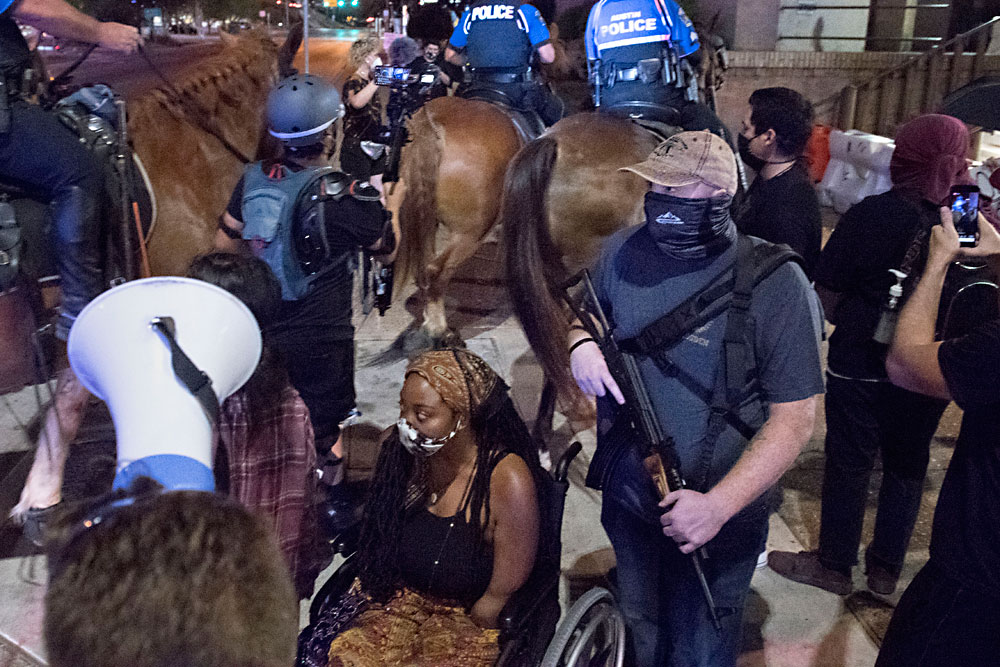
The Protests and the Trial
Garrett Foster and his fiancée Whitney Mitchell stood out among the activists who participated in the 2020 Black Lives Matter protests. Mitchell is a small Black woman, a quadruple amputee. Foster was a large white man and Mitchell's full-time caretaker, bathing her, brushing her teeth, feeding her, and, as she later put it, helping with "everything a person does through the day."
The couple began attending BLM protests after the murder of George Floyd. In Austin, Floyd's murder unleashed the most disruptive demonstrations in the city's history on May 30-31, 2020, with thousands of young people thronging APD headquarters, cursing police, and repeatedly shutting down I-35. Police responded by shooting dozens with mesh bags filled with lead shot, referred to as beanbag rounds. Many protesters were hurt, at least 20 of them critically.
After the violence, BLM protesters marched several times a week throughout the summer. Foster and Mitchell attended almost every protest. They typically began at APD at 7pm with speeches and chanting. The protesters then took over the Downtown streets, stopping at the Capitol and City Hall, then returning to APD between 10pm and midnight.
The protest on the evening of July 25, 2020, followed this pattern, except that on this night, instead of pushing Mitchell in her wheelchair as he usually did, Foster walked at the back of the marchers, carrying the AK-47 he had begun bringing to the protests. The couple's friend, Jeremy Lett, pushed Mitchell. They had been marching for two hours when they turned back toward APD at 9:50pm, heading north along Congress Avenue with about 20 others. As the group reached Fourth Street, Daniel Perry drove into the crowd.
Foster approached the car. He made some kind of comment to the driver inside. Almost instantly, Perry lowered the driver's side window and shot Foster five times in the chest with a .357-caliber revolver he'd had ready between the front seat and the console. Protesters screamed and ran. Foster collapsed.
Perry drove two blocks away, called 911, and surrendered to APD officers. He told them he'd been texting, that he hadn't seen the protesters, that he'd turned into them by mistake – claims that were disproven at the trial. He said he'd fired in self-defense, that he'd "never been so scared in [his] life."
Perry was interviewed by senior homicide Detective David Fugitt, a recently retired officer who remains a legend at APD. In a video played at the trial, Fugitt, seated, asked Perry, standing in front of him, to demonstrate how Foster had held the AK. Perry seems uncertain but holds an imaginary rifle pointed down at the officer. "I believe he was going to aim it at me," he stammers. "I didn't want to give him a chance to aim it at me, you know?" Fugitt later testified that he thought Perry had a legitimate claim of self-defense. He let him go.
José Garza, running for Travis County District Attorney at the time, promised the community that if elected he would present the Perry case to a grand jury. After winning in a landslide, he did. On July 1, 2021, a grand jury indicted Perry for murder, assault, and deadly conduct.
When the trial began in late March, lead prosecutor Guillermo Gonzalez kicked off the state's case by bringing in the protesters who saw Foster die on July 25, 2020. "I remember Garrett saying, 'Move on,' and I remember hearing gunshots and Garrett just falling down in front of me," Mitchell told the silent court, weeping, her words soft. "He just fell over and I remember jumping down and he was laying on the gun ... I had to scoot myself to him. I had to scoot myself over to him."
The half-dozen protesters who appeared next all repeated a version of the same story: They heard squealing tires as Perry's car sped into the group. They slapped and kicked the car. Garrett Foster strode to the car and said something to the driver. The window opened and Foster was shot. No one saw Foster raise his gun. APD officers testified that they recovered the gun with the safety on and no bullet in the chamber.
As decisive as the testimony was, it had been expected. What hadn't been – and what observers later decided was the turning point of the trial – were the social media posts and texts from Perry displayed on the trial's third day, demonstrating, in his own words, that he deeply hated BLM protesters and had fantasized about killing them. "I might have to kill a few people on my way to work, they are rioting outside my apartment complex," Perry wrote to a friend in June of 2020. "I might go to Dallas to shoot looters," he wrote on another occasion. In one post he wondered whether he would be allowed to cut off the ears – presumably as trophies – of protesters who "committed suicide" by challenging him.
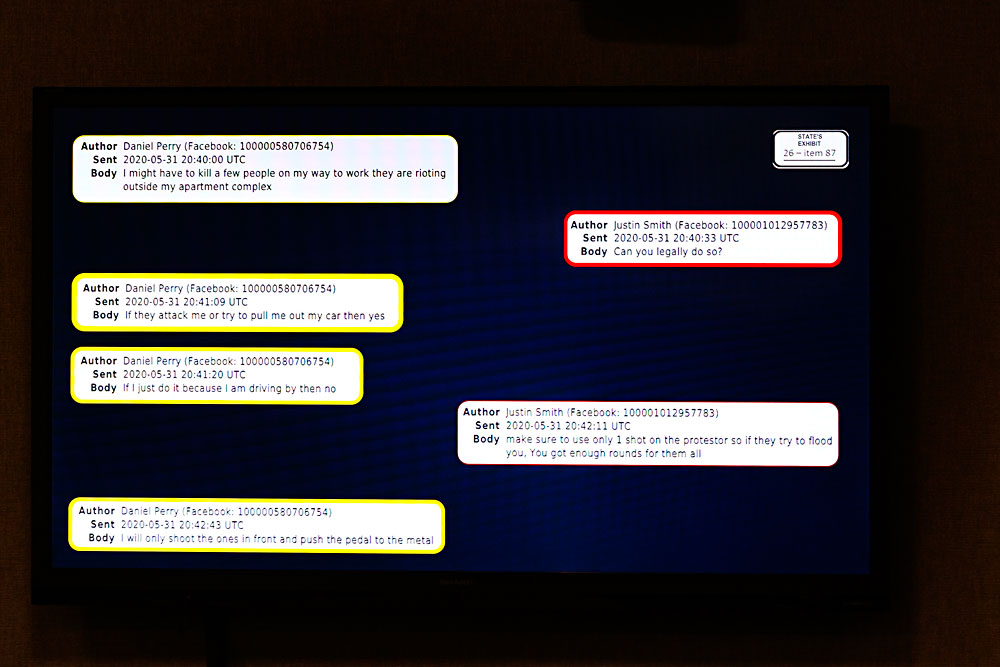
Perry also speculated about how he might get away with killing a protester – by claiming self-defense. Prosecutors presented a Facebook Messenger chat between Perry and a friend, Michael Holcomb, which occurred two weeks before he shot Foster. In it, Perry argued that shooting protesters was legal if it was in self-defense. Holcomb tried to talk Perry down. "Aren't you a CHL holder too?" he asked, referring to the men's licenses to carry concealed handguns. "We went through the same training ... Shooting after creating an event where you have to shoot, is not a good shoot."
Perry's attorneys, Doug O'Connell and Clint Broden, began presenting their defense on the sixth day of the trial. Much of it focused on how Foster had held his AK-47. Several witnesses, reviewing indistinct photos, testified that Foster was ready to shoot Perry and capable of doing so within a split second. Others said Perry had driven carefully, not recklessly, into the protesters.
The defense attorneys saved their best witness, Detective Fugitt, for last. "There was a legitimate argument for self-defense," Fugitt told the jury. He said pictures from the scene showed Foster with his elbow up, his feet set, ready to fire his weapon. During cross-examination, it became clear that Fugitt and Gonzalez did not like one another. The detective, quite mannerly when speaking with O'Connell, deflected Gonzalez's questions with a hint of a sneer. When Fugitt launched into a protracted defense of mistakes he'd made in a separate homicide case, brought up by Gonzalez, Judge Brown abruptly ended the digression. "The colloquy is too much at this point," the judge said.
In closing arguments, assistant prosecutor Elizabeth Lawson emphasized that Perry had "instigated this whole thing" and reminded jurors of Holcomb's admonition: "Shooting after creating an event where you have to shoot, is not a good shoot." O'Connell and Broden asked jurors to consider the fear they would feel in encountering someone with an AK-47. Broden smashed his foot into the side of a car door he'd brought into the court to show how frightening the protesters would be as they surrounded the car. He and O'Connell referred to them as "ants on candy."
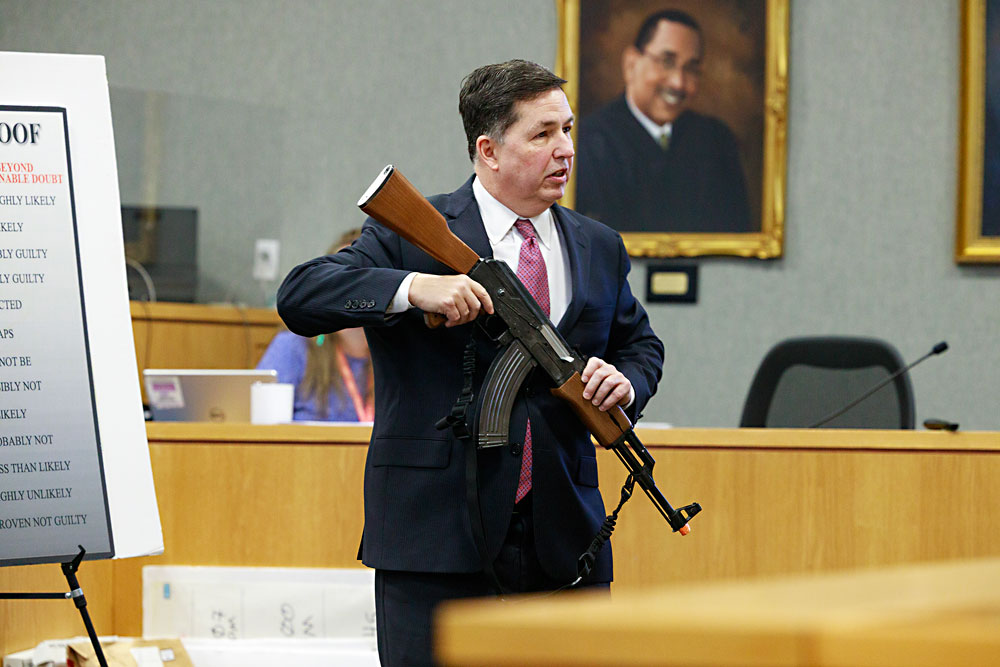
Lead prosecutor Gonzalez made the final presentation, returning to the idea of "instigation." He reminded jurors that Perry ran a red light and then lied by telling police he'd been texting and had pulled into the group by mistake. "That's the crux of this case – why did he run that red light?" Gonzalez asked. He tied the social media posts with what he referred to as Perry's instinctive recognition of a "target of opportunity." "They fit together quite nicely, the social media posts and the red light," Gonzalez said. "'And in Texas, I can get away with it' – that's his state of mind."
It took 16 hours for the jury to decide they agreed. There were gasps as the verdict was announced, then, gradually, the sound of sobbing. Mitchell wept with Foster's mother, Sheila. Perry's mother, on the other side of the courtroom, buried her face in her hands. Perry stood silently at first. Then, he collapsed into the arms of one of his defense attorneys, pushing his head against the man's chest and sobbing loudly. Moments later he was put in handcuffs and led away.
Two Legal Systems
Daniel Perry has not yet been sentenced as the Chronicle goes to press. Brown is expected to sentence him by the end of the week, after reviewing additional social media posts from Perry not seen at the trial.
On April 11, O'Connell and Broden requested a new trial, saying that Garza had suppressed evidence collected by Fugitt that supported Perry's self-defense claim. It was an old argument, first floated after Perry's indictment, that had never gone anywhere. Brown has yet to rule on it. Meanwhile, Garza asked the Board of Pardons and Paroles to grant an interview with his team and with Foster's family before issuing a recommendation on the pardon. It's a kind of interview that the board never conducts. The members of the board don't even meet each other face-to-face.
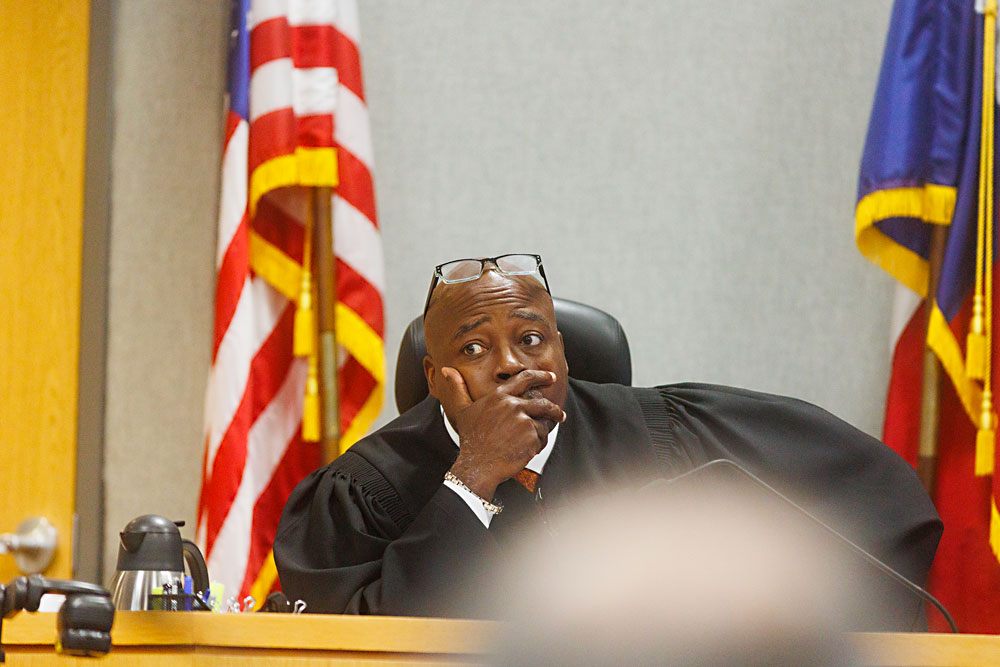
If they don't grant an interview, perhaps they'll consider Garza's public response to Abbott, a day after the proposed pardon. Then, Garza had, like so many others, invoked the rule of law. "In a state that believes in upholding the importance of the rule of law, the governor's statement that he will intervene in the legal proceedings surrounding the death of Garrett Foster is deeply troubling," he said. "In our legal system, a jury ... gets to decide whether a defendant is guilty or innocent – not the Governor."
It was a typically circumspect response from the D.A. Others were more expansive. "Gov. Abbott is just the cowardly, puppet face of Tucker Carlson with this pardon," said U.S. Rep. Greg Casar, D-Austin. "The jury deliberated for two days. Abbott didn't deliberate for two minutes before springing into action and promising a pardon because Tucker Carlson pushed him to. And that's just such a perversion of our criminal justice system – people being convicted, or not being convicted, or getting pardons, because of what extreme right-wingers on Fox News have to say. Abbott can't claim that he's for public safety or equal justice under the law or impartial trials after what he's done with Perry, and after what he threatened to do in these other cases."
Casar's mention of "these other cases" refers to a different threat by Abbott: that he will pardon 19 Austin police officers indicted by Travis County grand juries for shooting protesters with beanbag rounds during the May 30-31, 2020, demonstrations. The officers, charged with aggravated assault, could each be sentenced to 99 years in prison. O'Connell, who represents many of them, told the Chronicle he is not ready to comment on any potential pardons. But the cases are expected to begin filtering into county courtrooms in the coming year.
The Chronicle contacted Rinaldi and local GOP political consultant Matt Mackowiak to ask how Abbott's political career will benefit if he pardons a string of police officers. Neither wanted to go there. Katie Naranjo, the chair of the Travis County Democratic Party, said she has no doubt Abbott will pardon the officers if he gets a chance.
"That man couldn't find a moral compass if it were glued to him," Naranjo said. "He's going to continue to silence voices and this is the most literal silencing of a voice I've seen by the governor. Literally, someone peacefully protesting, who is openly carrying in the state of Texas – which is allowed thanks to Gov. Abbott and Texas law – was killed. The person who killed him had posted on social media that he wanted to do terrible things to Black Lives Matter protesters. And now the governor is pardoning that person before he's even eligible for a pardon. So, quite literally, Gov. Abbott, through this action, is killing the voices of peaceful protesters."
Many noted that Abbott's offer to pardon Perry is part of a trend: State Republicans, once the party of "local control," are increasingly seeking to dominate the criminal justice systems of Texas' large, progressive cities. On April 4, as Fugitt delivered his testimony, Republicans passed Senate Bill 20, which would force D.A.s to prosecute people accused of violating the state's abortion ban, along with low-level drug offenses and instances of "election fraud." Lt. Gov. Patrick has deemed the bill a priority. He refers to Texas' progressive D.A.s in terms reminiscent of black-and-white television shows, branding them "rogue prosecutors" whose "delinquent behavior will not be tolerated."
Garza is the rogue-est of these rogue D.A.s. In responding to Abbott, he vowed to continue doing what he's doing. But he was also careful to honor the victims in the Daniel Perry case – Garrett Foster's family. "I want them to know that the Travis County District Attorney's Office will continue to fight for a justice system that treats everyone equally, including Garrett Foster," Garza said. "I can imagine that justice must feel so elusive for them and right now, for that, I am more sorry than words can express."
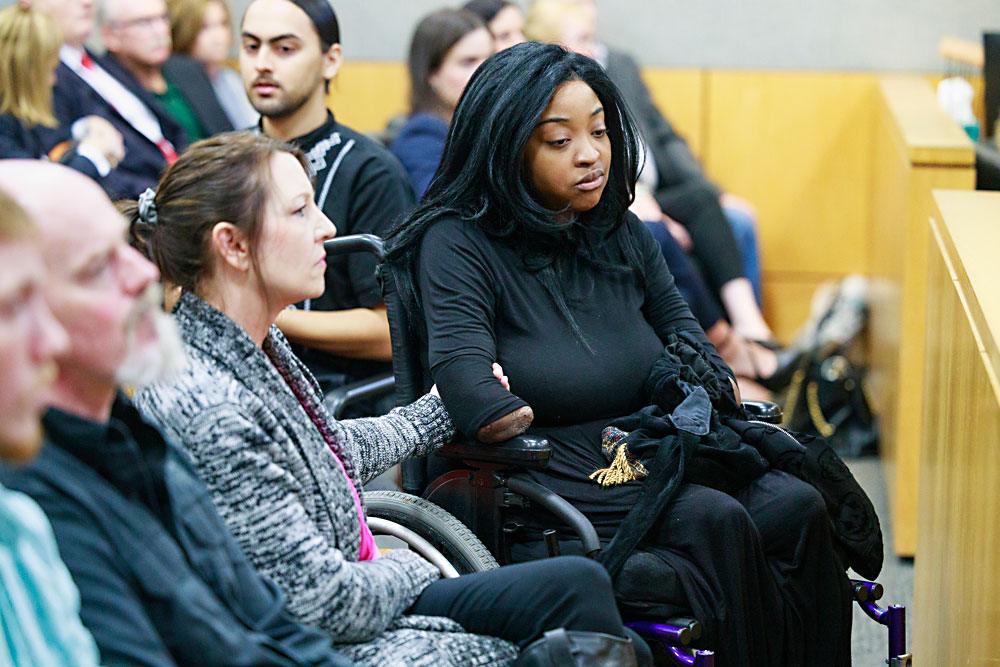
Whitney Mitchell is part of that family. She has never been eager to speak to the press and offered no comment after Perry's conviction. But the day after the governor's promise, she, too, released a statement, saying she hoped Abbott would never again make the claim that he stands for victims' rights.
"For the first time since I lost Garrett, I felt some sense of justice and relief when the jury rendered its verdict," Mitchell said. "But the governor has immediately taken that away since he announced there are two legal systems in Texas: one for those with power, like Mr. Perry, and one for everyone else."
Got something to say on the subject? Send a letter to the editor.





